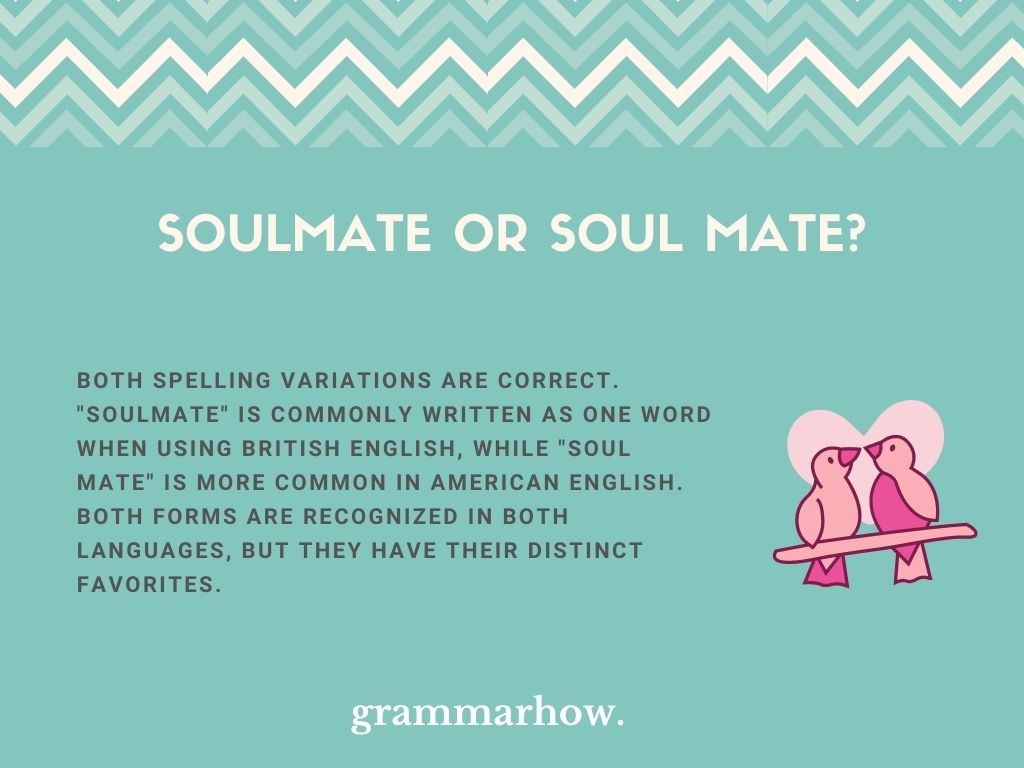There seem to be multiple spellings of “soulmate,” and it would help to understand why there are differences. This article will explore whether it’s one or two words, and we’ll help you to remember the difference between the forms.
Soulmate vs. Soul mate
Both spelling variations are correct. “Soulmate” is commonly written as one word when using British English, while “soul mate” is more common in American English. Both forms are recognized in both languages, but they have their distinct favorites.

According to Google Ngram Viewer, “soul mate” is the most popular choice in American English. This is a great way to see that it’s more popular for the words to be split into two. In this case, it’s known as a phrasal noun.

According to Google Ngram Viewer, “soulmate” has recently become the most popular choice in British English. The results are much closer this time, showing that both forms are acceptable, but it works well to show the differences between the languages.

The Cambridge Dictionary and The Oxford Dictionary only provide entries for “soulmate” as one word. Neither dictionary mentions that “soul mate” is a variation on the spelling either.
This might be because both dictionaries are British English, meaning they don’t always have the correct information about American English spelling.
It might also help to see more about the most popular choice in American English. We can refer to The New York Times website to learn more about common usage.
According to their website, “soul mate” is mentioned 2,530 times while “soulmate” is mentioned 609 times. This clear difference shows that it’s more common for American English to use two words.
We can do the same for British English by referring to The Daily Mail website to see which is more common.
According to The Daily Mail, “soulmate” is mentioned 12,500 times while “soul mate” is mentioned 3,790 times. This difference shows that one word is more appropriate for British English to use.
Is “Soulmate” One Word?
“Soulmate” is one word in British English. It’s commonly found in this way because there are rules that allow writers to group common words when they are always written together. As long as there is a distinguishable difference, “soulmate” works well.
The AP Stylebook is one such example that teaches us that it’s okay to group multiple words together. We can turn them into a hyphenated form if they modify another noun or drop the hyphen entirely if they become the noun themselves.
Since “soul” and “mate” are very obvious sounds that we can tell apart from each other, it makes sense to group them as one word. It’s still easy to read and pronounce when seen in this way, which is why it works well.
You might benefit from checking out these examples to give you a hand:
- I thought you were going to be my forever soulmate, but I was clearly wrong.
- Jack and Jill were soulmates, so they spent every waking hour together until they couldn’t anymore.
- We were soulmates once, but now I’ve given up on the idea!
- You don’t have a soulmate! No one could love you, and I don’t know why you try!
Is “Soul mate” Two Words?
“Soul mate” is more commonly left as two words in American English. This allows users to see the difference between the words, and “soul” is used to modify “mate” in this way. It becomes a phrasal noun (made up of an adjective and a noun).
These examples will explain how it works:
- If you’re not spending time looking for your soul mate, you’ll never manage to find them!
- He’s not your soul mate; I am! You’ve never looked at me in that way, but I promise you it’s true.
- She was supposed to be my soul mate, but it turned out that she was only in it for my money.
- They’re going to be the best soul mates of the lot! Just wait and see!
Tip To Remember The Difference
“Soulmate” is correct as one word because it’s when two souls intertwine with each other. Therefore, it makes sense to group the word into one.
However, we can also use “soul mate” as two words if we want to show that our “souls” have a profound impact on the word “mate.”

Martin holds a Master’s degree in Finance and International Business. He has six years of experience in professional communication with clients, executives, and colleagues. Furthermore, he has teaching experience from Aarhus University. Martin has been featured as an expert in communication and teaching on Forbes and Shopify. Read more about Martin here.
